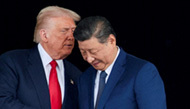NEW YORK
On September 4, Wolfgang Ischinger, the former German ambassador to the United States, attended the opening game of the American football season between the New York Giants and the Washington Redskins. It was a happy occasion at Giants Stadium - made more festive by the home team’s victory.
Ischinger, now a senior executive of Allianz, a big German insurance company, was a guest of the Tisch family, prominent New York Jews who own half the Giants and a lot of New York real estate. Their get-together involved business as well as pleasure.
Negotiations were nearing completion on a deal under which Allianz would pay more than $25 million a year to have the company name on the Giants’ new $1.3 billion stadium being built next to the old one in New Jersey and set to open in 2010. The Tisches, having done due diligence on Allianz, seemed happy with the idea.
Then, all hell broke loose.
Within a week of the game, the New York Daily News had a headline screaming that the Giants “deal with the devil.” An illustration showed the stadium with a swastika daubed on it.
The spark for the uproar was the fact that Allianz, in common with most large German companies that existed at the time, dealt extensively with Hitler’s Third Reich, insuring concentration camp facilities. It has taken decades for Allianz to resolve compensation claims from heirs to victims of the Holocaust.
By September 12, the deal was off. Both sides tried to smooth over the debacle, but Allianz, which has large holdings and thousands of employees in the United States, was left in a state of shock.
“Nobody predicted this kind of firestorm,” Ischinger told me.
I am appalled by New York’s Allianz witch hunt. I lived in Berlin for three years, a period covering the establishment in 2000 of a multi-billion-dollar fund negotiated by the United States and German governments to compensate Naziera slave laborers and settle outstanding insurance claims.
As part of this accord, the International Commission on Holocaust Era Insurance Claims, of which Allianz has been a core member, has paid out more than $300 million.
Yes, it is late in the day. But the United States was party to this international pact. Allianz has long been a global corporate citizen of high repute. Stuart Eizenstat, the senior Clinton administration official who negotiated the agreement, was among those consulted by the Tisches before the uproar started.
Memory is volatile and irrational. As Pierre Nora, the French historian, has remarked, “Memory is life. It is in permanent evolution.”
The “evolution” took several decades, but Germany, like Allianz, has confronted guilt and strived to make amends. No other nation has agonized so much over finding an adequate memorialization of monstrous national crimes.
It is time for reconciliation. It is time to stop invoking the devil. It is time to stop daubing swastikas. It is time to respect Allianz’s American employees.
I said memory is irrational. The United States has a magnificent Holocaust Memorial Museum but no equivalent Washington institution dedicated to the ravages of race. Why does the Holocaust, a German crime, hold pride of place over slavery and segregation?
I am not sure. But it is clear that the election of Senator Barack Obama would be a victory over painful United States history. If America can do that, New York and its large Jewish community can also triumph over the hateful manipulation of painful memories.
스마터리빙
more [ 건강]
[ 건강]이제 혈관 건강도 챙기자!
[현대해운]우리 눈에 보이지 않기 때문에 혈관 건강을 챙기는 것은 결코 쉽지 않은데요. 여러분은 혈관 건강을 유지하기 위해 어떤 노력을 하시나요?
 [ 건강]
[ 건강]내 몸이 건강해지는 과일궁합
 [ 라이프]
[ 라이프]벌레야 물럿거라! 천연 해충제 만들기
 [ 건강]
[ 건강]혈압 낮추는데 좋은 식품
[현대해운]혈관 건강은 주로 노화가 진행되면서 지켜야 할 문제라고 인식되어 왔습니다. 최근 생활 패턴과 식생활의 변화로 혈관의 노화 진행이 빨라지고
사람·사람들
more
[‘파친코’ 이민진 작가,인터뷰] “이민자와 취약계층 보호해야”
재미 한인 작가 이민진(57)씨가 새해 1월1일 뉴욕시장으로 취임하는 조란 맘다니(34) 뉴욕시장 당선인에 대해 “맘다니 시장이 긍정적인 변화…

김응화무용단, LA 카운티 연말축제서 ‘화관무’
김응화무용단이 지난 24일 열린 LA 카운티 연말 문화행사 제66회‘할러데이 축제’ 무대에 초청돼 한국 전통무용 ‘화관무’를 선보였다고 밝혔다…
이민단속·산불 영향 LA카운티 인구 감소
LA 카운티 인구가 올해 상당수 감소한 것으로 나타났다. 캘리포니아 주 재무국이 최근 발표한 자료에 따르면 올해 7월1일 기준 LA카운티의 인…
한인 2세, 드라마 ‘런’ 주연 맡아
권호열 세계무술총연맹 총재의 아들 에릭 권씨가 주연하는 드라마 ‘런(RUN)’ 시사회가 지난주 버지니아 애쉬번 소재 리걸 폭스 극장에서 열렸다…
[송년 행사] 코윈 퍼시픽 LA
한민족 여성네트워크(KOWIN) 퍼시픽 LA(회장 조미순)는 23일 LA 용수산에서 2025년 송년회를 열었다. 이날 행사에는 가정폭력 피해 …
많이 본 기사
- 영주권자도 생체정보 전면 확인 1
- [새해 달라지는 교통법규] 과속·음주운전 처벌 가주서 대폭 강화
- ICE 단속 전략 전환… ‘현장 체포’ 급증
- 신년 연휴에 또 비 이번주 ‘강풍주의보’
- 최대 신년축제 로즈퍼레이드 D-3… 꽃차 장식 한창
- 이민자 트럭 운전사들 “면허박탈 위법” 소송
- ‘前 박유천 약혼녀’, ‘엄마’ 됐다더니..황하나, “400만 원 명품패딩” 뽐내며 3번째 구속길 걸었다
- 다크 초콜릿·커피 속 ‘테오브로민’… “세포 노화 늦춘다”
- 트럼프 정부, 이민 2세대까지 공격
- 국무부 비자·여권 정책 총괄에 ‘미용실 사장’?
- 2025년 미국의 경제
- 5 Fwy 다중추돌 참사 1명 사망·15명 부상
- 연말에 일가족 5명 숨진 채 발견… 경북서 손자·조부까지 3대 ‘비극’
- 건강한 노년을 위한 식사법, 무엇을 어떻게 먹어야 할까
- 사유리, 아들과 기모노 가족사진.. “아빠 없어 불쌍? 웃어넘겨”
- “ ‘X진상’ 이시영, ‘매너타임’ 아무런 소용 없었다”..캠핑장 만행 폭로 줄줄이
- LA시 아파트(1978년 이전 건설) 렌트비 연 4% 이상 못 올린다
- 엔비디아, 기술계약으로 규제 회피
- [이민법 칼럼] O-1 비자와 개인 스폰서
- 펠로시 “중간선거서 민주당이 하원 다수당 될것”
- NASA 국장 “트럼프 임기내 달 착륙”
- 어도어 “다니엘, 뉴진스 함께 하기 어렵다..전속계약해지 통보”
- 401(k) 백만장자 50만명 돌파… 시간·복리 투자 ‘결실’
- Rise of Amazon
- 브리짓 바르도 별세 왕년의 스타, 91세로
- ‘황희찬 침묵’ 울브스 리버풀에 져 11연패
- 2025년의 최대 패배자(Loser of The Year 2025)는?
- [메건 매카들 칼럼] 역차별 당하는 젊은 백인 남성들
- 지메일 주소변경 가능 구글, 앞부분 새 설정
- ESPN “애틀랜타, 김하성 영입으로 가장 큰 약점 메웠다”
- 캐스테익 지역서 대형 가스관 폭발 누출
- 은값 77달러 돌파, 역대 최고치 행진
- [2025년 주요 경제이슈] “트럼프발 혼돈… 금·AI는 높은 수익”
- 북동부 3년만에 최대 폭설 ‘항공대란’
- CJ, 미국서 전통주 문화 확산 나서
- [화제 기업] 회사 팔리자 해고 대신 ‘44만달러’ 보너스
- 연말엔 르세라핌! K팝 그룹 유일 美 최대 규모 새해맞이 라이브 쇼 출연 ‘기대 UP’
- 젤렌스키, 트럼프와 ‘마러라고 담판’… 러는 무력시위
- 가주 고속철 재정계획 ‘궤도 수정’
- 배관 시설 사용 느는 연말… 갑작스러운 고장 피하려면
- 미국이 K-푸드 주력시장… 중국 제치고 1위 부상
- 세밑의 단상(斷想)
- 겨울 모서리
- [만화경] 봉황의 청와대 귀환
- A World of Voices
- “해외 소포 파손·폐기·배송지연 속출”
- “빅테크, AI 부채 1,186억달러 장부서 제외”
- 올해 미 기업 파산 신청 증가
- 트럼프 관세… 와인 시장도 ‘휘청’
- 웨스트브룩, 존슨 앞질러 NBA 통산 어시스트 7위… 팀은 탈꼴찌
1/5지식톡

-
 미 육군 사관학교 West Poin…
0
미 육군 사관학교 West Poin…
0https://youtu.be/SxD8cEhNV6Q연락처:wpkapca@gmail.comJohn Choi: 714-716-6414West Point 합격증을 받으셨나요?미 육군사관학교 West Point 학부모 모…
-
 ☝️해외에서도 가능한 한국어 선생님…
0
☝️해외에서도 가능한 한국어 선생님…
0이 영상 하나면 충분합니다!♥️상담신청문의♥️☝️ 문의 폭주로 '선착순 상담'만 진행합니다.☎️ : 02-6213-9094✨카카오톡ID : @GOODEDU77 (@골뱅이 꼭 붙여주셔야합니다…
-
 테슬라 자동차 시트커버 장착
0
테슬라 자동차 시트커버 장착
0테슬라 시트커버, 사놓고 아직 못 씌우셨죠?장착이 생각보다 쉽지 않습니다.20년 경력 전문가에게 맡기세요 — 깔끔하고 딱 맞게 장착해드립니다!장착비용:앞좌석: $40뒷좌석: $60앞·뒷좌석 …
-
 식당용 부탄가스
0
식당용 부탄가스
0식당용 부탄가스 홀세일 합니다 로스앤젤레스 다운타운 픽업 가능 안녕 하세요?강아지 & 고양이 모든 애완동물 / 반려동물 식품 & 모든 애완동물/반려동물 관련 제품들 전문적으로 홀세일/취급하는 회사 입니다 100% …
-
 ACSL 국제 컴퓨터 과학 대회, …
0
ACSL 국제 컴퓨터 과학 대회, …
0웹사이트 : www.eduspot.co.kr 카카오톡 상담하기 : https://pf.kakao.com/_BEQWxb블로그 : https://blog.naver.com/eduspotmain안녕하세요, 에듀스팟입니다…
케이타운 1번가
오피니언
 옥세철 논설위원
옥세철 논설위원2025년의 최대 패배자(Loser of The Year 2025)는?

세밑의 단상(斷想)
 메건 매카들 워싱턴포스트 칼럼니스트
메건 매카들 워싱턴포스트 칼럼니스트 [메건 매카들 칼럼] 역차별 당하는 젊은 백인 남성들
 조형숙 시인·수필가 미주문협 총무이사
조형숙 시인·수필가 미주문협 총무이사 겨울 모서리
 한영일 / 서울경제 논설위원
한영일 / 서울경제 논설위원 [만화경] 봉황의 청와대 귀환

새해 더 중요해지는 노동법 준수

연말연시, 안전하고 차분하게
 캐슬린 파커 워싱턴포스트 칼럼니스트
캐슬린 파커 워싱턴포스트 칼럼니스트 [캐슬린 파커 칼럼] 지미 라이의 마지막 희망
 유경재 나성북부교회 담임목사
유경재 나성북부교회 담임목사 [한국춘추] 미국의 힘
1/3지사별 뉴스

물류거점창고에 불체자 8만명 수용 추진
도널드 트럼프 행정부가 이민자 구금·추방을 효율화하기 위해 전국 물류거점 창고에 8만명 규모의 수용시설 확보를 추진한다고 24일 워싱턴 포스트…
‘학자금 상환’ 안하면 임금압류

“온 세상에 희망·평화의 빛 스며들길”
가자지구와 우크라이나에서의 전쟁, 고립과 불평등으로 세상이 어지러운 가운데 워싱턴 지역 각급 한인교회와 성당들이 성탄절을 맞아 일제히 예배와 …
“연말은 스트레스·새해 결심은 없다”

“올해 최고 주목받은 테크 거물은 머스크 아닌 래리 엘리슨”
올해 미국에서 가장 주목받은 기술업계 거물은 일론 머스크 테슬라 최고경영자(CEO)가 아닌 래리 엘리슨 오라클 창업자·회장이라고 블룸버그 통신…
[새해부터 이렇게 달라진다] 최저임금 또 오르고… 유급 병가는 더 확대

오늘 하루 이 창 열지 않음 닫기 



















































.png)


댓글 안에 당신의 성숙함도 담아 주세요.
'오늘의 한마디'는 기사에 대하여 자신의 생각을 말하고 남의 생각을 들으며 서로 다양한 의견을 나누는 공간입니다. 그러나 간혹 불건전한 내용을 올리시는 분들이 계셔서 건전한 인터넷문화 정착을 위해 아래와 같은 운영원칙을 적용합니다.
자체 모니터링을 통해 아래에 해당하는 내용이 포함된 댓글이 발견되면 예고없이 삭제 조치를 하겠습니다.
불건전한 댓글을 올리거나, 이름에 비속어 및 상대방의 불쾌감을 주는 단어를 사용, 유명인 또는 특정 일반인을 사칭하는 경우 이용에 대한 차단 제재를 받을 수 있습니다. 차단될 경우, 일주일간 댓글을 달수 없게 됩니다.
명예훼손, 개인정보 유출, 욕설 등 법률에 위반되는 댓글은 관계 법령에 의거 민형사상 처벌을 받을 수 있으니 이용에 주의를 부탁드립니다.
Close
x